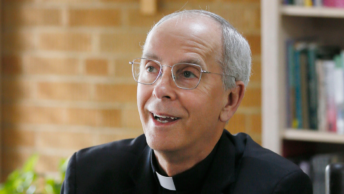On this thirty-first Sunday in Ordinary Time, I place before you the image of an on-off switch.
Earlier this month, Steve Jobs, one of the co-founders of Apple Computer, passed away. Having waged a long and protracted battle with pancreatic cancer, this great innovator, who some have described as the “Henry Ford” of our time, helped bring to market products that have truly transformed the ways in which we communicate with one another. From MacBooks and iPods to iPads and iPhones, these gadgets have become so intertwined in our daily lives that many of us, to quote an old credit card commercial, would not think of leaving home without them.
It is also interesting that in the days leading up to his death, Jobs is said to have wrestled with the idea of on-off switches. Early in his life, he boldly proclaimed:
…You’re born alone, you’re going to die alone. And does anything else really matter? I mean, what is it that you have to lose? You know, there’s nothing.
However, as death drew nearer, his early views seemed to soften:
…Maybe it is because I want to believe in an afterlife. That when you die, it doesn’t just all disappear. The wisdom you’ve accumulated. Somehow it lives on. But sometimes I think that it’s just like an on-off switch. Click and you’re gone. And that’s why I don’t like putting on-off switches on Apple devices.
During the past weeks, as we have encountered Matthew’s Gospel, there have been many of these on-off or this-that questions presented to Jesus. They have included parables of the Rich young man (19:16-30); Laborers in the vineyard (20:1-16); Two sons (21:28-32); and Wicked tenants (21:33-43). In each story, Jesus’ role was that of a great “clarifier,” given that He carefully pointed out right from wrong and moved us toward actions leading toward life and salvation, not death and ruin. It was as though He were holding up an on-off switch to the crowds and proclaiming: “This way will move you toward love and salvation and this will not.”
In last Sunday’s Gospel (Mt 22:34-40), we remember that the proud and scholarly religious authorities sought out Jesus for yet another confrontation. As these heirs of Moses, whose ancestors had received the Ten Commandments and developed 613 religious regulations that adherents of Judaism were to live by, drew near to Him, they pointedly demanded an answer to the question of which commandment was the greatest? Most of us have committed Jesus’ response to heart:
You shall love the Lord your God with all your heart, with all your soul, and with all your mind. This is the greatest and first commandment. The second is like it: You shall love your neighbor as yourself. The whole law and the prophets depend on these two commandments. (Mt 22:34-40)
Once again, Jesus’ words proved so damaging to the questioners, it is as though an arrow had pierced their hearts. One might even say that Jesus had created a proverbial “toxic” situation in which the religious authorities had reached their final rope. In just two short chapters, we begin the Passion, Death, and Resurrection.
In today’s Gospel (Mt 23:1-12), Jesus takes His message to the streets and crowds that had come to hear Him speak. And with the scribes and Pharisees able to hear, He instructs the people to:
Do and observe all things whatsoever they tell you, but do not follow their example. For they preach but they do not practice. They tie up heavy burdens hard to carry and lay them on people’s shoulders, but they will not lift a finger to move them. All their works are performed to be seen.
Like the prophet Malachi who railed against the priests of his day (1:14b-2: 2b, 8-10), Jesus calls the religious leaders of His time hypocrites, for they impose burdens and rules upon people that they do not follow. And He reminds those present that:
You have but one teacher, and you are all brothers…The greatest among you must be your servant. Whoever exalts himself will be humbled; but whoever humbles himself will be exalted.
And so we ask, where does this leave us? When most of us think of hypocrites, we often point to public figures. Politicians have long been easy targets, but in recent years, clergy scandals have provided ample hay for the secular pundits: “See, I told you they preach but do not practice.” And this behavior has surely weakened the Church. But while we point our fingers at others in order that we might see a speck in our brother or sister’s eye, we do well to look at ourselves, for in the mirror, we might find that a log has been lodged in our own. As such, while making our list of hypocrites, we should be sure to add our own name to that list.
Once more, I ask, where does all this leave us? Are we humans just a discredited bunch of sinners with nowhere to go? One of my favorite future saints, Venerable Father Solanus Casey, once weighed in on this when he said:
God could have established His Church under the supervision of angels who have no faults or weaknesses. But who can doubt that as it stands today, consisting of and under the supervision of poor sinners- successors to the poor fishermen of Galilee; the Church is a more outstanding miracle than any other way?
As Jesus reminds us in the Gospel, those who seek the kingdom need to understand God’s perspective; namely, that true leaders will be those who serve, and that those who serve humbly will be exalted. In his Letter to the Thessalonians (2:7-9, 13), St. Paul tells us that leaders (and we are all leaders in various capacities) should be gentle, supportive, and loving of one another. In my own life, I have been reminded of this wisdom. Three years ago, in the week leading up to my ordination, an older priest told me that “in your ministry, may you always be pastoral, lift others up, and remember that all that you have been given has come from a loving and merciful God.”
In returning to where we began, while we do not know what happened when the switch went off on Mr. Job’s earthly life, we pray that our Lord has welcomed him into eternal life. May we also pray for an understanding of Jesus’ message that living a God-centered life is difficult, but if, at each junction of our life, we remember to flip the switch toward love and mercy, we will have not only understood His commandment to love God and neighbor, but, moreover, we will have lived it.








